Everyday we ship out calibration test weights to our 1800scales.com customers. Many customers love our cast iron grip handle weights, while others rely on our NIST Class F stainless steel cylinder weights and portable weight kits. We offer the test weights themselves or you can add a traceable certificate if you're quality control department needs the documentation. Technology, Experience, and Commitment best describe our weight sales department. 1800SCALES.com offers only the best calibration test weights available.
Our weight suppliers have been supplying high-quality precision measurement products and services for over 30 years. The combination of world class manufacturing technology, an experienced staff of professionals, and a commitment to total quality enables our weight suppliers to lead the industry in attaining a variety of quality certifications including ISO 9000 and ISO/IEC 17025. Most of our test weight orders ship out within a day or two.
If you order a traceable certificate, that can add about four extra days to the lead time. Also, each weight that we supply is made for you so please carefully make your weight selections as we do not accept returns.
What kind of certification requirements do you need for your calibration test weights?
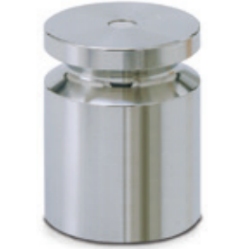 Calibration Stainless Steel Weights
Calibration Stainless Steel WeightsOur selection stainless steel cylinder style test weights is designed to help you purchase exactly what you need quickly & efficiently. We have many different size calibration weights available in grams or pounds. These are meticulously crafted for precise accuracy to NIST F standards.
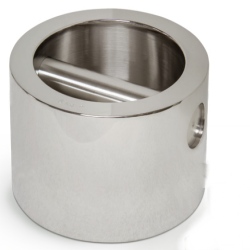 Stainless Steel Grip Handle Weights
Stainless Steel Grip Handle WeightsStainless Steel Grip Handle Weights are ideal for customers who need high quality weights that are easy to move around. These weights are a better choice for laboratory weighing than cast iron grip handles which tends to rust and needs to be repainted each year. Various sizes & capacities available.
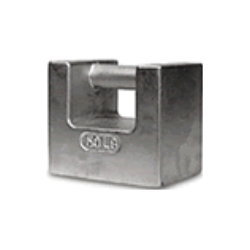 Cast Iron Test Weights
Cast Iron Test WeightsCast Iron Test Weights typically are painted silver for pound versions and gold for kilogram versions. The design usually incorporates a grip handle in the middle for transporting the weight. We have some lightweight models that are ASTM but most are ASTM 5 tolerance.
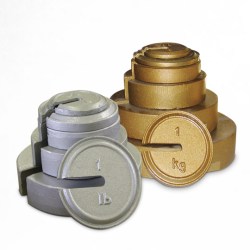 Slotted Interlocking Weights
Slotted Interlocking WeightsOur selection of slotted weights is perfect for various weighing applications when paired with our various weight hangers that we have available. These cast iron products are highly accurate and can be setup to achieve a wide variety of weight totals. Built to NIST F tolerance.
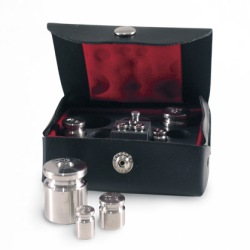 Test Weight Kits (metric)
Test Weight Kits (metric)We have a wide variety of NIST class F test weight kits featuring metric weights. The kits are ideal for customer who need to transport weights to different locations and they're also great for neatly storing weights for safe keeping. Various groupings and quantities available.
 Test Weight Kits (pounds)
Test Weight Kits (pounds)Calibration Test Weight Kits are ideal for customers who need to carry weights to various locations, safely and securely. Our Avoirdupois weight kits are available in various configurations with weights like 10 lb, 5 lb, 2 lb etc.. along with carry case. NIST class F tolerance.
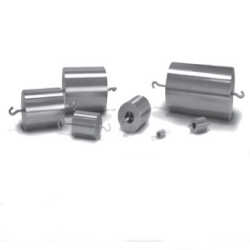 Hook Weights
Hook WeightsThese are specialized weights with a hook so they can be used in various applications. Avoirdupois and Metric Individual Hook Weights, ASTM class 6 tolerance.
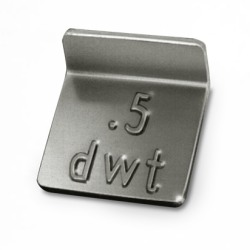 Leaf Weights
Leaf WeightsLeaf weights usually are available in very tiny milligram sizes. Typically with stainless steel construction and NIST Class F tolerance.
Weights are needed for routine testing of balances and scales. A scale tech places a certified test weight on the device and if it is within tolerance, the device is working correctly. If the device is out of tolerance, it is calibrated using that same weight.
Stainless steel weights in most cases are recommended. These weights are much better at corrosion resistant. Cast iron weights need to be cleaned and painted occasionally.
Curious what weights are used to calibrate scales? In most cases to calibrate small retail scales, we use stainless steel cylinder weights or grip handle weights. To calibrate bench scales or floor scales we use painted steel cast iron weights. To test and calibrate truck scales we use large 1000 pound cast iron weights.
It is possible to calibrate a scale using the weight of a person or some known weight in order to "get by" until a better method is available. We don't recommend this, but it certainly happens in the real world occasionally. If you have to do this, we recommend using a known weight that is consistently the same and doesn't change. For example a person's weight changes and will likely not be the exactly the same the next day.
Depending on how often the weights are in use, weights should probably be re-calibrated every 1-2 years. Periodic recalibration of test weights at an accredited state laboratory is essential for continued accuracy. How often you recalibrate your test weights is up to you. We recommend you take your weights to your state lab on a yearly or every other year frequency.
We've been offering test weights for scales for over twenty years. Our calibration weights are used in testing a scale and in scale calibration.
In most industrial scales the tolerance is 0.1 of one percent. So on a five thousand pound capacity scale, at max capacity the tolerance would be +/- five pounds.
